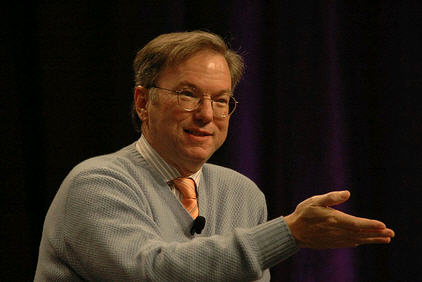Google's Eric Schmidt: "What kills a company is not competition but arrogance. We control our fate."

Ken Auletta's "The Search Party: Google squares off with its Capital Hill critics" article in the recent New Yorker has some good tidbits about how Google operates. He sits in on a product review meeting and speaks with numerous people at Google and close to company to paint a picture of Google "think."
On Capital Hill, Google now has more than 30 people lobbying on its behalf and it will probably need more as it moves into new areas that could be disruptive. Auletta wrote:
Unlike Microsoft, which in 2000 was found guilty of anti-competitive behavior, a finding upheld in a federal appellate court, Google has not been charged with violating any laws. But there has never been a company whose influence extended so far over the media landscape, and which had the ability to disrupt so many existing business models. And its competitors share a vague worry that Google is more or less out to rule the world.
He also quotes Andy Grove, former Intel Chairman and CEO: “Microsoft’s power was intra-industry. Google’s power is shaping what’s happening to other industries.”
Google CEO Eric Schmidt does his best in speaking with Auletta to minimize fears about Google having a plan to rule the media world:
“When you have a technology that is as engrossing as the Internet, you’re going to have winners and losers. I’m not trying to sound arrogant. I’m trying to sound rational about it. The Internet allows people to consume media in a different way.” He believes that because Google is “run by three computer scientists we’re going to make all the mistakes computer scientists running a company would make. But one of the mistakes we’re not going to make is the mistake that non-scientists make. We’re going to make mistakes based on facts and data and analysis.” He paused. Then he said, “What kills a company is not competition but arrogance. We control our fate.”
I guess what Schmidt is saying depends on how you define arrogance and controlling your fate. Google certainly has a serious case of technical arrogance, which is to be expected when you populate a company with talented engineers.
Similar to Microsoft's culture before the company became to big and organizationally complex, an employee base of the smartest nerds in the class tends to breed at least intellectual arrogance.
And Google has plenty arrogance on its business side, which is a sign of a company printing money like no one else has ever done.
It's pretty arrogant to say the you control your fate, but for the engineer in Schmidt, empirical data is a basis of control. There is plenty of margin for error even if Google has the best and most data to mine and some of the smartest data miners and interpreters.
As Andy Grove once said, ""=""> Google's three computer scientists need to keep that in mind and inculcate it among the rank and file.
Google's ultimate arrogance may be in thinking that it's science and engineering culture isn't arrogant:
Science moves with the spirit of an adventure characterized both by youthful arrogance and by the belief that the truth, once found, would be simple as well as pretty.--James D. Watson
